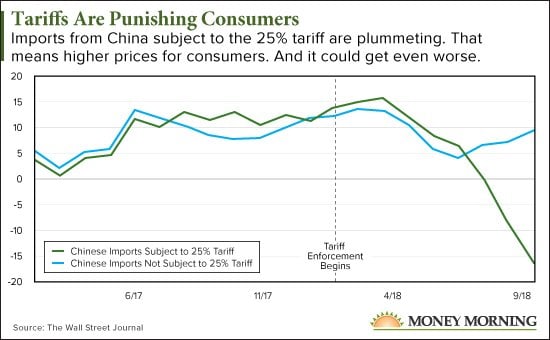The Dow is down more than 1,200 points over the last month, and the near 5% collapse threatens to make this the index's first negative year since the 2008 crash.
The culprit is 2018's biggest bogeyman: the trade war.
The United States imposed a 25% tariff on $50 billion worth of Chinese goods on June 15, including a 10% tariff on $200 billion of other exports. But the tariffs on the $200 billion worth of goods are going to be raised to 25% if a new trade deal isn't reached in 90 days. That's nearly half of all Chinese imports.
And the reason higher tariffs are sinking stocks is precisely because the tariffs are working...
How Higher Tariffs Could Ruin Your Portfolio
While tariffs and the trade war dominate headlines, it's hard to visualize exactly why tariffs are such a threat to your wealth.

But take a look at how drastic their effect on business has been...
Since the 25% tariff rate on $50 billion of Chinese good was announced, these imports have dropped from an increase of 15% on the year, to a decline of nearly 20%. That's a 35% swing in a matter of months.
And it will get three times as bad if the new tariffs go into effect in 2019.
A 35% (and growing) collapse of another $150 billion of imports from our largest trading partner could devastate the stock market. These goods include everything from Apple Inc. (NASDAQ: AAPL) iPhones to washing machines to solar panels. Few businesses are safe.
Of course, you might be thinking, "if tariffs are working, that must be a good thing."
But there are two big problems with that reasoning.
Tariffs are like a national sales tax on imported goods. They simply make the imported goods more expensive, which makes people less likely to buy them. The idea is to push people to buy goods made in America by making foreign goods seem much more expensive.
The first problem is there may not be an American-made good ready to replace an imported one. Higher tariffs might encourage companies to begin manufacturing goods in the United States again, but that could take a long time.
The second, and bigger, problem is that tariffs increase the price of all goods, whether they are made in the United States or not. Companies manufacture products overseas to make them cheaper, but if tariffs succeed in moving manufacturing back to the United States, then consumers will be paying more money for the same product.
That also means they'll be buying less across the board.
And a sudden shock of less spending couldn't happen at a worse time.
It could even cause the next recession.
It's been over a decade since the start of the last recession. The stock market is in the middle of the longest bull market ever. Unemployment is at its lowest rate in a decade. Companies are reporting their highest profits ever.
That means the economy has nowhere to go but down, and we are due for a correction.
But thanks to a failure to fix problems from the Great Recession, the next one could be even worse.
Fortunately, you'll be prepared when the disaster strikes...
Financial Disaster Is Looming - These Are the Tools You Need to Survive
[mmpazkzone name="in-story" network="9794" site="307044" id="137008" type="4"]
Millions of investors will lose everything as the average stock traded on Wall Street is poised to plunge by at least half.
But now, you could grow $1.5 million wealthier this year - even as the trouble plays out.


